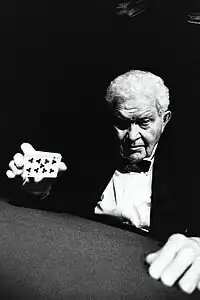Jerry Andrus
Jerry Andrus (January 28, 1918 – August 26, 2007) was an American magician and writer known internationally for his original close-up, sleight of hand tricks, such as the famous "Linking Pins", and optical illusions.
Jerry Andrus | |
|---|---|
 Andrus performing at The Magic Castle in Hollywood, California | |
| Born | January 28, 1918 Sheridan, Wyoming, U.S. |
| Died | August 26, 2007 (aged 89) Albany, Oregon, U.S. |
| Education | Self-taught |
| Occupation(s) | Magician, writer, inventor, scientific skeptic |
| Known for | Creator of world-renowned magic tricks and optical illusions |
Early life
Andrus was born January 28, 1918, in Sheridan, Wyoming.[1] At the age of 10, he moved to Albany, Oregon, where he lived until his death in 2007. At 12, Andrus became interested in the art of illusion when he saw a performance of a reformed "spiritual medium".[2] He joined the International Society of Junior Magicians when he was 16 and soon became known as a "magician’s magician".[2]
Career
Magic
A self-taught magician, Andrus preferred to develop his own style rather than learn the craft as traditionally handed down from other magicians, eventually becoming world renowned as one of the "best and most-influential 'close-up magic' performers ever."[1][3] He was known to many accomplished contemporary magicians, such as Lance Burton, Doug Henning, and Penn & Teller, for this unique brand of close-up, sleight-of-hand magic.[1]
International card magicians knew Andrus for his "Master Move", a sleight-of-hand classic "pass" without "necessary false movement".[4]
An early member of The Magic Castle in Hollywood, California, Andrus performed there semi-annually until shortly before his death.[1]
Illusions
Andrus created his illusions in his Oregon home, which he nicknamed "The Castle of Chaos" in reference to the numerous items he collected over the years with the hope of using them to "make something spectacular".[3][5]
In 1954, Andrus created the famous "Linking Pins",[2][6] a close-up illusion in which closed safety pins are rapidly linked together in twos, threes and chains.[7]
Skepticism
Andrus was committed to the promotion of science and warned of the dangers of pseudoscience, psychics, cons, and other deceptions.[8] An avowed scientific skeptic and agnostic, Andrus often lectured at scientific and skeptic conferences, using his optical illusions and magic tricks to demonstrate the ease with which the mind can be fooled by the eye. He discussed a form of cognitive science that attempted to explain that because the mind is working on an unconscious level, it can be fooled into misperceiving apparently normal sensory experiences.[1]
List of works
Books and lecture notes
- Andrus Deals You in (1956)
- Sleightly Miraculous (1961)
- Special Magic (lecture notes for 1974 Japan Tour) (1974)
- More Sleightly Slanted (lecture notes) (1977)
- Andrus Card Control (with Ray Hyman) (2000)
- Kurious Kards and $5 Trix (2001)
- Safety Pin-Trix
Media
See also
References
- Neary, Robert; Smith, Tyson (October 24, 2008). Andrus, the Man, the Mind & the Magic. Archived from the original (Documentary film) on September 4, 2008. Retrieved October 25, 2008.
- Randi, James. "Jerry Andrus". James Randi Educational Foundation. Archived from the original on February 9, 2009. Retrieved October 25, 2008.
- Raskauskas, Nancy (October 23, 2008). "The genuine magician". Corvallis Gazette Times. Archived from the original on October 25, 2008. Retrieved October 25, 2008.
- Greg, Edmonds. "Jerry Andrus". International Brotherhood of Magicians. Archived from the original on June 9, 2009. Retrieved October 26, 2008.
- "Jerry Andrus". SandLotScience.com. Archived from the original on October 7, 2008. Retrieved October 25, 2008.
- "Magicians' Biographies". Magictricks.com. Archived from the original on September 28, 2008. Retrieved October 26, 2008.
- "Linking Pins". Magictricks.com. Archived from the original on October 11, 2008. Retrieved October 26, 2008.
- Swiss, Jamy Ian. "Take Two #44: Jerry Andrus". www.magicana.com. Retrieved February 25, 2023.
- "Jerry Andrus". Meir Yedid Magic. Archived from the original on December 1, 2008. Retrieved October 25, 2008.
- "A Thing of Wonder". Archipelago. Archived from the original on December 18, 2008. Retrieved October 26, 2008.
